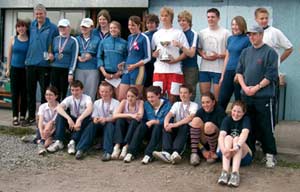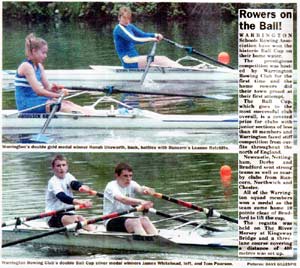The Ball Cup
The day dawned dark and cloudy,
by 10:30am the clouds were lifting and the sky brightening.
By 12:00 we were in bright sunshine. How beautifully the weather
may echo human emotion. A mellow sunlight played over land and
water as 200 smiling faces packed up their boats and went home
clutching pot medal and pleasurable memory at the end of a long
day.
The Ball Cup is a regatta run for Junior oarsmen,
that is, kids between the age of 12 and 18. It was created by
an old school master who had become fed up by the children under
his tuition being soundly thrashed by all the big schools and
clubs. So he organised his own regatta, restricted the size
of the clubs that could enter to the very small and created
an event so well conceived that it survives largely unaltered
to this day. It thrives on sportsmanship, fair play, and most
of all, on having a good time.

Members of Warrington School's Rowing
Association celebrate winning the Ball Cup
(centre). Shakey is second left. (click to enlarge)
Most of the competitors had never won in their
sport. For some, this was their very first regatta. To walk
away even with a third place was something very important to
them. A lad I know called Simon rowed at the Ball Cup. He rowed
in an event with only two boats in it. His crew was beaten by
a quarter of the length of the course, but his face lit up when
he was presented with the silver medal. That's the essence of
the Ball Cup, and it is, undoubtedly, a Good Thing.
At the start of the story, the Ball Cup was in
grave danger of not happening this year. After a month and a
half of paper-work flying every which way, most of it going
in circles without moving forwards, our preferred location for
the Ball Cup refused us permission. We asked all the local clubs
if they would be interested, but we either had no reply, or
were blocked by the original venue. We had a crisis. At the
eleventh hour, as the possibility of cancellation hove into
view, a club 13 miles away was asked if they would have an interest
in the event. It was the first time in two months that I had
heard the word "yes". This was the turning point.
The club in question was Warrington Rowing Club,
the club at which I now row, and the committee awarded myself
and my double partner Kirstin the job of co-ordinating the regatta.
We were flattered, but more than a little nervous. Neither of
us had ever run a regatta, and with a combined aged of 36 we
knew we had an uphill struggle.
Weeks passed as we carefully split out the jobs
and worked out a timetable, and all was going to plan until,
as the middle of April rolled by, we realised that we had less
than a month to organise the event, and had done far less than
we thought! Letters went flying in all directions, and the entries
started to come in. As we waded through the administration of
designing courses, finding officials, fulfilling our safety
obligations, our event slowly became a mammoth. As the entries
closed at 9pm on Friday the 7th of May we had 150 entries and
the largest event ever held on the River Mersey.
Panic set in, we hadn't bargained on an event
this big. Suddenly lots of things had to be changed - the course
had to be three lanes, a logistical nightmare on our curved
river, our catering had to be re-evaluated, parking... the list
was almost endless. At midnight we thought we had the draw thrashed
out, but 24 hours later I was still correcting minor mistakes
in it. On the Sunday, we thought we had the end in sight, the
draw and competition details had been emailed to all the competitors,
the buoy lines set out, the boathouse was clean and ready to
go.
I decided to take Monday off work, as I had last
minute twitches, and a large sheet of paper covered in jobs
to do. After a day running round, I turned into the club to
drop everything off, to see the buoy lines cut and lying knotted
in the water. This was a disaster. Not only did this represent
hours of work which needed re-doing, but it also raised serious
questions about the security of the event - would we arrive
on Wednesday morning to see the bouys lying slack on the water,
or worse, disappeared out to sea?
On Tuesday I took a canoe out to see what could
be done. But the job was hopeless. As I paddled back to the
club I thanked my lucky stars that Dennis, the club's odd job
man and all round nice bloke, was there. Between us we were
able to get a launch in the water, and have a serious go at
the lines. We spent all morning coiling and cutting the lines
that had knotted to an unbelievable complexity. I spent all
afternoon running the lines out. At 7pm, with only two hours
of daylight left, we began bouying the 1200 yards of lines we
had out. At 9pm, with the light fading, I stepped back on shore,
to meet a boat trailer I was finding safe refuge for overnight.
We had just done it. Kirstin had set up all the paperwork in
the boat club and we were, just, set up for the morning.
Kirstin couldn't get the day off work on Wednesday,
so I was left in sole charge of the regatta. I was worried,
were my buoys still there? And more importantly, if things went
wrong, how would I, a total novice, cope? I was fortunate in
that Shakey, the club Chairman had taken responsibility for
finding officials, and he had come up trumps. At 10:30am we
had boats on the water ready to race, and were only delayed
by 15 minutes by a late official. Shakey took practical responsibility
for running the regatta, and I was largely redundant - free
to talk with clubs and individuals, see that everyone was happy.
By 12:30pm we had been running for two hours and
had dropped a further five minutes. Kirstin and I, through necessity,
had timetabled the races to a tight schedule - one race every
three minutes. We had been helped by one club pulling out at
the last minute, and despite a ribbing from Graham, co-ordinator
for the Ball Cup nationally (it is run in two seperate regattas,
one in the North, and one in the South) about the timetable,
we gained time through the afternoon.
The timetable ran until four with a mini-regatta
organised by one of the attending clubs between themselves taking
place afterwards. The last timetabled race went through on four,
to the minute, an almost unheard-if occurence. I had said before
the event that if we had organised the event properly I would
have nothing to do. In actual fact I had back-heeled a medal
problem, and my only responsibility had been totting up the
club scores to see who had won the Ball Cup, a very pleasurable
one. Success!
At the final count 110 crews had raced 80 races
in 37 events giving 250 smiling faces (We, the organisers were
as pleased as the competitors) and had made a not inconsiderable
sum of money for the club. The day could not have run better,
and it was, I feel, due to the skill and commitment of those
who quietly and effectively ran the regatta I had organised.
Particular credit is due to Shakey for running the event on
the day, Kirstin for doing the paperwork, and Dennis for doing
all the little jobs that nobody else had time to do.

Cutting from local paper The Warrington
Guardian
(click to enlarge)
So what did I learn from it? I learned a lot of
management skills, the importance of getting the right people
in the right jobs, the importance of delegation. But I also
learned the great pleasure of giving up ones own time to help
others, particularly children.
The image of Simon coming to find me in the finish
line tent, with a big grin on his face, to show me the medal
he'd won is something that will stay with me for my life.
And next year? I swore I'd never do it again but...
maybe... just maybe...
Coming soon... a week on the Norfolk Broads in
a traditional wooden sailing cruiser...
Take Care
Alistair
Wasey

